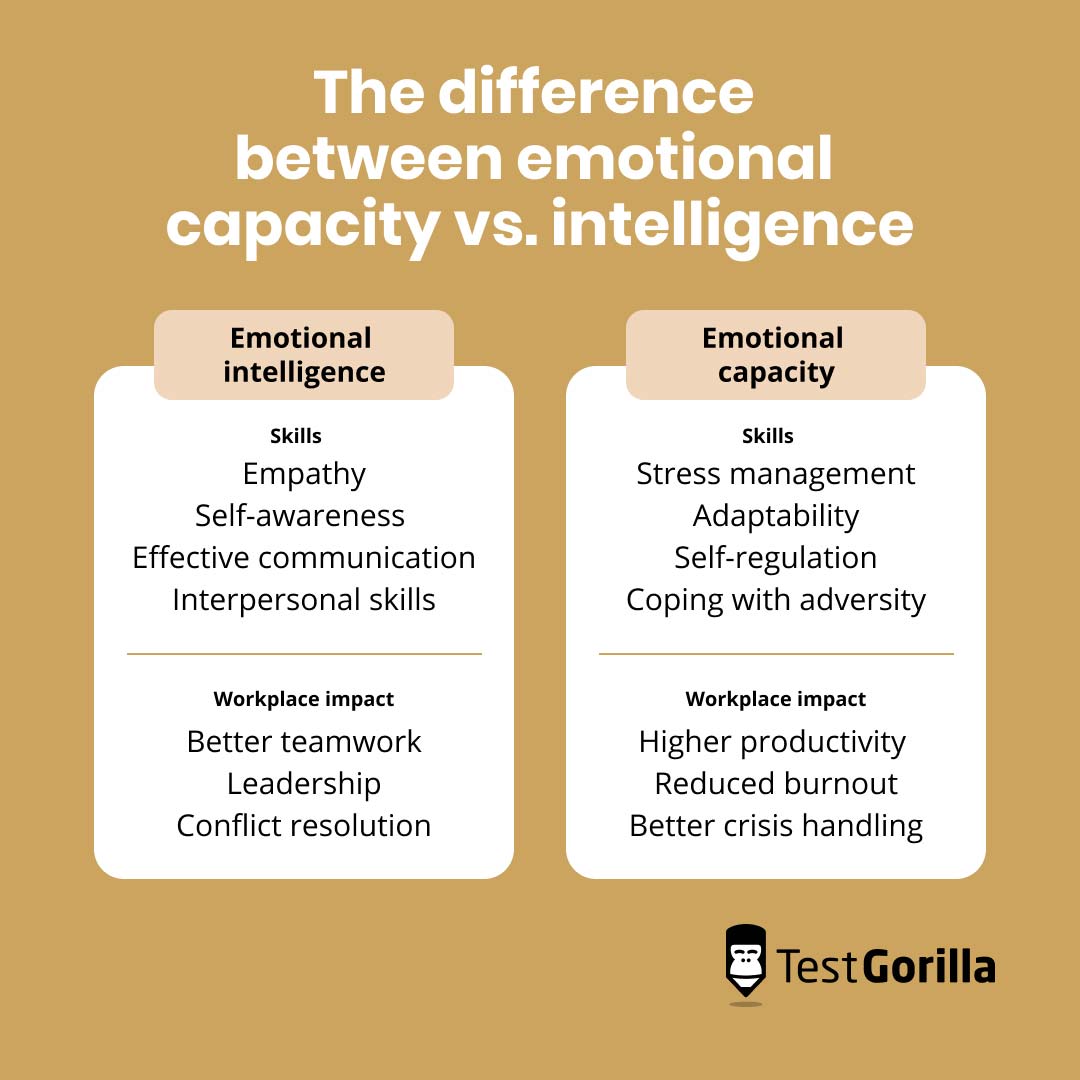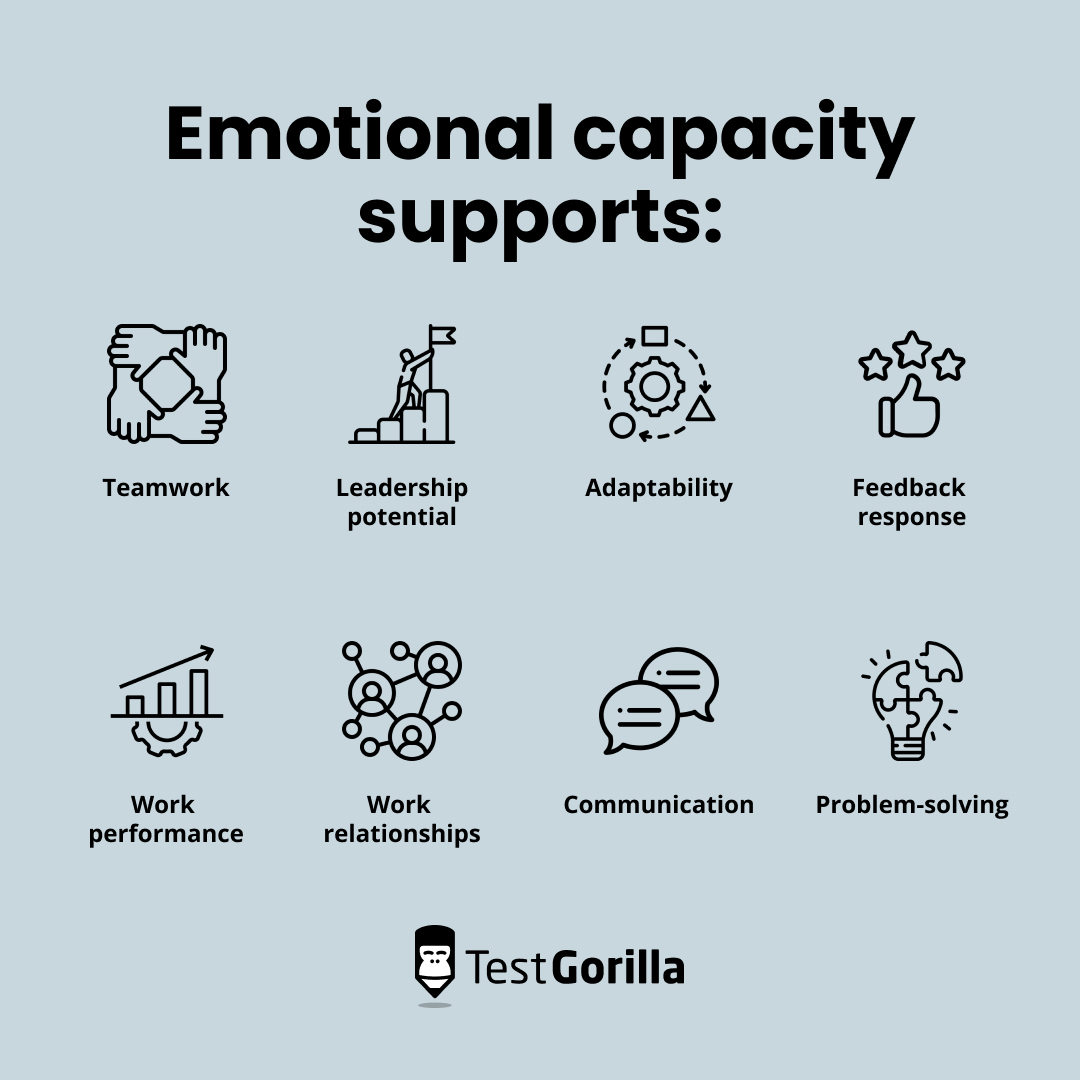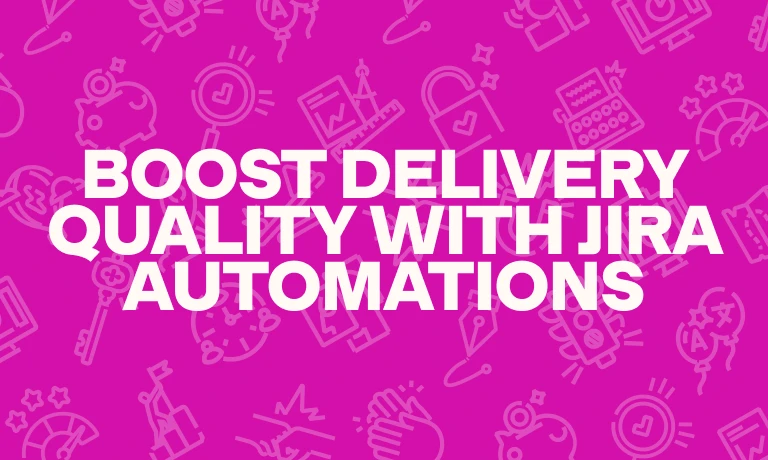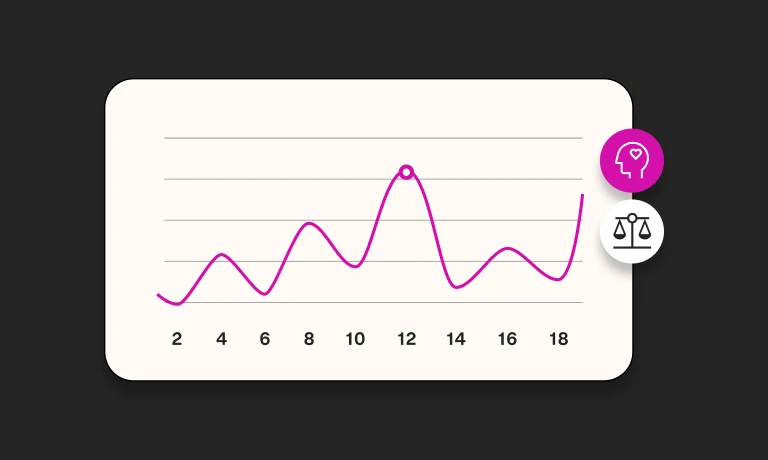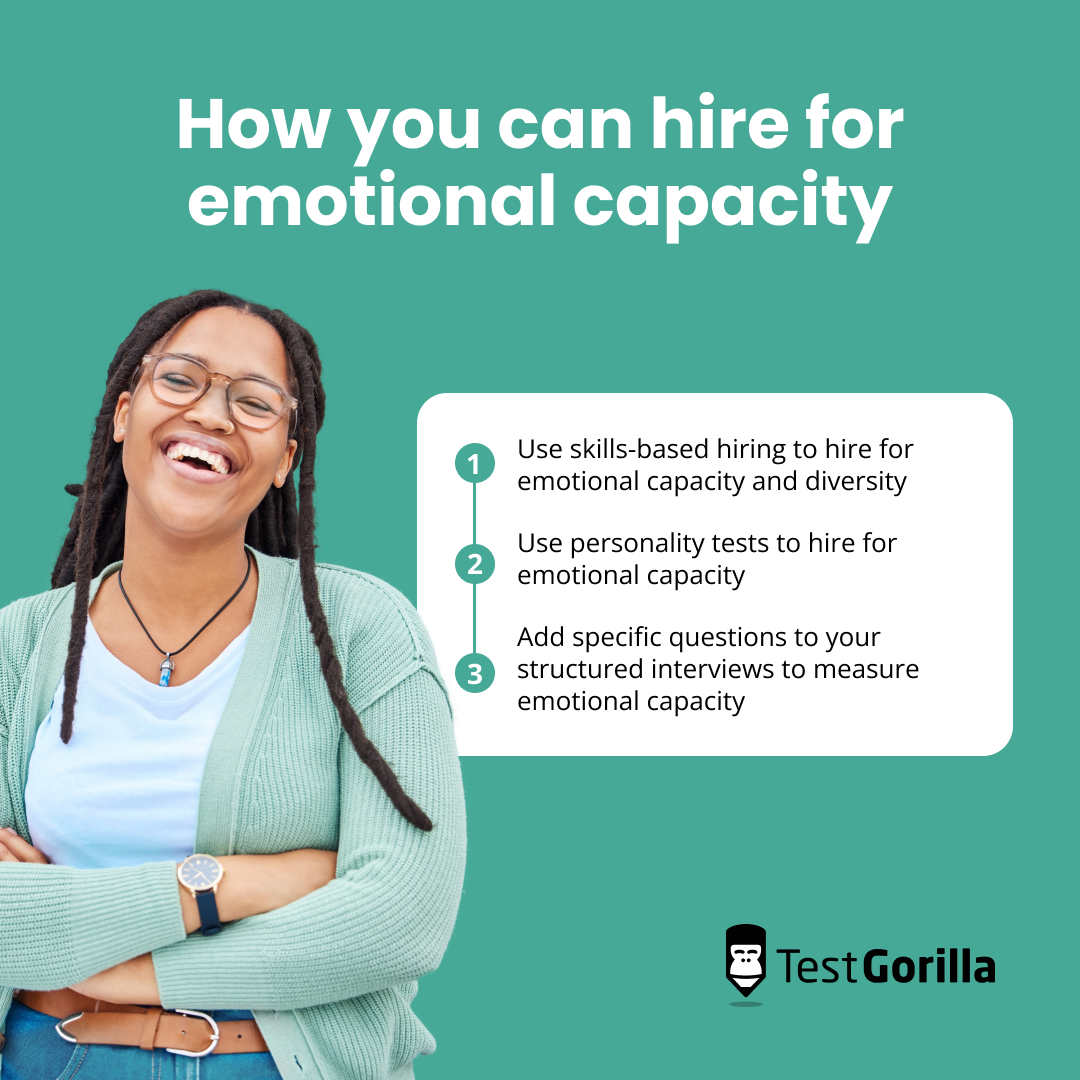How to build emotional capacity in the workplace (and how to hire for it)
John struggles to perform in a hectic startup environment despite his technical brilliance. Funding rejections take a toll, leading to stress-induced burnout and impacting both his performance and team cohesion.
In contrast, Lisa thrives amidst the chaos. When another funding opportunity falls through, she adapts and starts to innovate. Her focus and dedication during late-night coding sessions inspire her team and unite it under a shared goal.
What, exactly, sets these two employees apart? Unlike John, Lisa has high emotional capacity, which helps her navigate stress, adapt to challenging situations, and overcome personal problems.
With this guide, you can build emotional capacity in your workforce and teach the Johns how to cope with difficult situations.
In addition, we present different skills tests and strategies to help you hire more Lisas, ensuring you have a workforce with strong emotional regulation and high emotional intelligence.
What is emotional capacity?
Emotional capacity, or emotional resilience, refers to a person’s ability to effectively manage and adapt to emotional challenges, stressful situations, and adversity. Higher emotional capacity enables people to cope with difficult situations, empathize with others, and maintain emotional balance even in challenging situations.
We all have different emotional capacities defined by our emotional limits. When stress levels exceed these limits, we feel overwhelmed, experience burnout, and cause damage to our mental health.
High emotional capacity is an attractive trait in potential candidates because many positions involving difficult projects and tight deadlines are better suited for the adaptability of talent with high emotional capacity.
Hiring managers and recruiters are always on the lookout for people with high emotional capacity because they’re adaptable, innovative, and make great, empathetic leaders.
Emotional capacity vs. emotional intelligence: What’s the difference?
You’ve probably heard of emotional intelligence, but you may be confused about how it differs from our definition of emotional capacity. So, what is emotional intelligence, anyway?
Emotional intelligence refers to an individual’s ability to identify, understand, and manage their emotions and the feelings of others around them. It also helps people understand how their emotions affect others, which can improve teamwork.
Meanwhile, emotional capacity refers to how a person handles difficult emotions. It encompasses the ability to handle stress, adapt to challenging situations, and maintain mental wellbeing.
Emotional intelligence is more about skills and awareness, and emotional capacity is about strength and resilience.
Let’s compare the main differences in the table below:
Aspect | Emotional intelligence | Emotional capacity |
Relevant skills | Empathy, self-awareness, effective communication, and interpersonal skills. | Stress management, adaptability, self-regulation, and coping with adversity. |
Potential strengths | Better interpersonal relationships, communication, and teamwork. | Ability to thrive under pressure, handle challenging projects, and maintain a positive outlook. |
How to assess | Typically assessed through tests like the DISC personality test. | Assessed through behavioral interviews, situational judgment tests, and personality assessments. |
How to develop | Can be improved through training and self-reflection. | Can be improved through stress management techniques, resilience-building, and developing coping strategies. |
Workplace impact | Better teamwork, leadership, and conflict resolution. | Higher productivity, reduced burnout, and better crisis handling. |
Why is emotional capacity important?
Emotional capacity is vital for individual and collective success because it fosters resilience, adaptability, and positive workplace dynamics.
Here’s why employees with high emotional capacity are great for your organization:
1. Emotional capacity empowers the person and those around them
Emotionally intelligent people find it easier to navigate challenges with resilience without losing their spirit. This empowers them to do a better job and inspires those around them to thrive despite the difficulties.
2. People with high emotional capacity make great leaders
Good leaders often have high emotional capacity, enabling them to empathize, motivate others, and navigate complex challenges with ease. They also have the social skills to support and encourage others to grow during difficult times, which is crucial for good team cohesion.
3. Emotional capacity increases adaptability and agility
Changing project objectives, tight deadlines, and market shifts are often stressful for everyone in your team.
Those with higher emotional capacity can process unforeseen challenges, pivot strategies, and maintain focus amid uncertainty, helping them adapt and stay agile.
These behavioral competencies are vital for creating a workplace culture that embraces change and innovation.
4. Higher emotional capacity makes people more open to feedback
People with high emotional capacity are better equipped to receive and act on employee feedback constructively. This openness stems from a strong sense of self-awareness, which helps them avoid emotional responses and view feedback as a tool for personal and professional growth.
Having high emotional capacity also helps leaders accept upward feedback, which creates a positive feedback loop within the team.
5. For some job roles, emotional capacity is non-negotiable
In certain high-stakes roles, such as crisis intervention or leadership positions, having emotional capacity is a must.
The ability to manage emotions, make sound decisions under pressure, and maintain composure in emotionally charged situations becomes non-negotiable for success in these positions.
6. Emotional capacity affects work performance, physical health, mental health, and working relationships
Emotional health is important for work performance but also influences other parts of life. When people are under stress, their mental health can suffer, affecting their physical health, work performance, and working relationships.
Those with higher emotional capacity can cope with stress well and maintain a secure emotional state, ensuring their wellbeing and performance don’t suffer.
7. Emotional capacity boosts communication and problem-solving
People with higher emotional capacity can navigate conflicts with empathy, foster open dialogue, and collaboratively solve problems. This capacity for effective communication and creative problem-solving creates a more transparent and innovative work environment.
The best insights on HR and recruitment, delivered to your inbox.
Biweekly updates. No spam. Unsubscribe any time.
7 ways to build emotional capacity in your workforce
Emotional capacity is not a fixed trait. It’s a dynamic skill people can nurture and improve through training and becoming more self-aware about the most common stressors and strategies to deal with them.
This section unpacks seven strategies to help build and improve emotional capacity in your workforce.
Summary of best strategies for building employee emotional capacity
Strategy | Summary |
1. Encourage managers to open up to their teams during one-on-ones | Managers should use one-on-ones to demonstrate vulnerability and encourage employees to open up about their personal struggles |
2. Encourage a positive company culture and promote workplace empathy | Incorporate empathy training, support open communication, promote team collaborations, and celebrate employee contributions |
3. Encourage employees to set healthy boundaries at work and avoid burnout | Educate employees on the importance of setting healthy boundaries, clarify roles and expectations, offer flexible working arrangements, and monitor workload |
4. Offer emotional capability training to managers and staff | Organize interactive workshops that include self-reflection exercises, stress management techniques, and communication skill-building |
5. Offer mental health support across your organization | Promote mental health breaks, provide mental health resources, offer flexible working arrangements, monitor workload, and regularly survey employees for satisfaction |
6. Make sure your employees are taking time off | Discourage hustle culture, promote time off to recharge and destress, implement clear vacation policies, and celebrate time off. |
7. Encourage healthy relationships at work and social events to build camaraderie | Organize team-building exercises, create inclusive workshops, establish mentorship programs, organize social events, and practice employee appreciation. |
1. Encourage managers to open up to their teams during one-on-ones
Building better emotional capacity in employees begins with fostering an environment of openness and support. You can do that by encouraging managers to open up during one-on-one meetings.
Remember, these meetings are not only an opportunity to review work performance – they can also help managers and employees get to know each other better, discuss challenges, and see whether employees are satisfied with their current roles.
During one-on-one meetings, managers can set the tone by opening up themselves, sharing experiences, and demonstrating vulnerability. This act humanizes the manager and encourages team members to feel comfortable discussing their own challenges and emotions.
Managers can also politely ask about employees’ personal lives and where the company can support them. The main idea is to view the employee as a whole person, not just a revenue-generating cog in the machine.
This practice helps employees understand that their leaders care about the emotions of others. Employees feel heard and valued and know that managers are on their side no matter the challenges. That builds emotional capacity and supports employee engagement.
Keep in mind that 68% of workers consider quitting because they don’t get the necessary support from their seniors. So, use one-on-one meetings to hear the employees and prevent involuntary turnover.
2. Support a positive company culture and workplace empathy
According to research, 72% of people have quit because of a toxic workplace.
You may think that the problem is their low emotional capacity, but the real problem is a lack of effort from companies to develop a positive culture for supporting employee wellbeing and workplace empathy.
Unfortunately, many big-name executives lead by fear, compromising psychological safety at work. When there’s a lack of psychological safety, your employees are less likely to talk about concerns, ask questions, share opinions, propose ideas, or admit mistakes without fear of ridicule or negative consequences.
To avoid that, you can create a positive company culture and promote workplace empathy by:
Incorporating empathy training
Promoting team collaborations
Supporting open communication
Offering mental health support
Recognizing and celebrating employee contributions
3. Encourage employees to set healthy boundaries at work and avoid burnout
According to a recent Top Workplaces study, 38% of employees feel overwhelmed at work. They often feel anxious or upset because of their job, which also disrupts their personal life. Unfortunately, that’s a quick path toward employee burnout.
You should help employees establish healthy work boundaries to prevent burnout. Remember, stressed and overworked employees are not productive, no matter how high their emotional resilience.
Here’s how you can make your workplace less stressful:
Educate employees on how to set healthy boundaries at work
Clarify roles and expectations
Define communication boundaries
Monitor workload
Create a flexible working policy
4. Offer emotional capability training to managers and staff
Emotional capability training initiatives equip employees with the right skills and tools to navigate emotional challenges effectively. They nurture emotional intelligence and resilience, granting employees a deeper understanding of their own emotions and increasing self-confidence.
As a result, employees become better at identifying triggers and responding to difficult situations in a more productive way, improving their decision-making and emotion regulation.
The benefits of emotional capability training include:
Better stress management
Improved communication
Higher emotional capacity
Better self-awareness
Increased empathy
Here’s what emotional capability training looks like: You organize a half-day workshop where experienced trainers help employees engage in various interactive activities. The day kicks off with self-reflection exercises, encouraging participants to identify their emotional triggers and responses in different scenarios from their life experiences.
The workshop then covers practical techniques for stress management, offering tools like mindfulness and deep breathing exercises. Employees participate in role-playing activities and group discussions, learning how to apply these techniques in real-life scenarios.
The training then focuses on communication, helping participants practice active listening, expressing negative emotions constructively, and receiving feedback gracefully.
The training concludes with a personalized action plan for each participant, outlining specific steps to integrate newfound emotional skills into their daily work and personal lives.
5. Offer mental health support across your organization
According to recent surveys, 43% of middle management experience burnout, and 70% of C-suite executives consider leaving for a job due to a lack of company care about employee mental health.
The typical signs of employee burnout include:
Sickness
Absenteeism (or taking more sick days than usual)
Mistakes
Cynicism
Depression or exhaustion
Anger or persistent irritability
Lack of motivation
Low job satisfaction
Poor customer reviews and scores
Working odd hours (logged out at 10:00 pm when they’re usually off at 7:00 pm)
That can affect employee performance, productivity, and teamwork.
Here are some tips to improve mental health in your organization:
Provide mental health awareness training
Offer access to mental health resources as part of the employee healthcare plan
Promote mental health breaks
Offer flexible working arrangements
Be mindful of employee workload
Survey employees to assess engagement and satisfaction
Recognize and celebrate achievements
Promote a healthy work-life balance
6. Make sure your employees are taking time off
Time off work is necessary for emotional wellbeing. It offers employees an opportunity to recharge, destress, and reconnect with themselves.
When individuals are well-rested and have time to pursue personal interests, they are better equipped to manage their emotions, handle challenges, and exhibit greater empathy towards co-workers. All of these are signs of higher mental and emotional capacity.
Encouraging employees to use time off work helps them disconnect from common work-related stressors and return to their roles with renewed energy and enthusiasm.
That’s why many people-first companies have started offering unlimited PTO (paid time off) as some of the most enticing employment benefits.
It’s a great way to boost productivity, increase engagement, and promote employee wellness.
Here’s how you can promote time off:
Discourage hustle culture
Encourage managers to take time off
Implement clear vacation policies
Encourage schedule planning
Offer flexible working hours
Celebrate time off
7. Encourage healthy relationships at work and social events to build camaraderie
Social events can improve teamwork and communication while building a supportive atmosphere. They are vital outlets for employees to unwind, blow off steam, share experiences, and boost emotional capacity.
Here’s how to encourage healthy relationships at work and social events:
Organize engaging team-building activities
Create inclusive workshops
Establish mentorship programs
Promote open communication
Recognize and appreciate employees
How to hire for emotional capacity: 3 proven methods
Hiring for emotional capacity can be a strategic move.
However, you shouldn’t fire employees with low emotional resilience. Your team is valuable, and it’s often better to help them build the necessary skills to thrive in their roles than to build a new team from scratch. This means these tips are primarily for when you’re expanding and need to hire new employees.
Here’s how you can hire for emotional capacity:
1. Use skills-based hiring to hire for emotional capacity and diversity
Skills-based hiring focuses on vetting candidates on their specific skills and competencies. This strategy shifts the focus from traditional criteria like education and experience to a more nuanced evaluation of what a candidate can bring to the role.
Skills-based hiring can also help assess the emotional capacity and emotional intelligence of candidates. For example, situational judgment tests can present candidates with real-world scenarios and see how they navigate challenging situations, handle stress, and maintain composure based on their answers.
You can combine situational judgment tests with personality tests to create a comprehensive emotional capacity or emotional intelligence assessment.
But skills-based hiring can help you find more than just the right emotional fit.
It’s also a strategy that removes your unconscious biases, helping create a hiring process that values diverse talents. This cultivates a workplace culture of inclusiveness and diversity.
2. Use personality tests to hire for emotional capacity
Personality tests can help you screen potential candidates for emotional intelligence and capacity.
For example, our Big 5 (OCEAN) test improves your pre-employment screening process to hire more quality candidates. It evaluates five dimensions of personality: openness, conscientiousness, extroversion, agreeableness, and emotional stability.
The last one especially gives us a good insight into a candidate’s emotional capacity.
These personality tests can help you predict job performance, reduce bias, create a more positive hiring experience for the candidates, and make the hiring process quicker and easier. In fact, using our tests has helped Revolut to reduce time-to-hire by up to 40%.
3. Add specific questions to your structured interviews to measure emotional capacity
Structured interviews are a standardized approach to the hiring process. In a structured interview, each candidate is asked a predetermined set of questions carefully designed to assess their qualifications, skills, and suitability for a particular role.
The same set of questions ensures a consistent and fair hiring process.
Here are some emotional capacity example questions (and potential answers) you can ask candidates:
Question | What to look for |
- Can you provide an example of a significant professional failure you’ve experienced?
- How did you respond to it, and what did you learn? | Look for candidates who recognize failure and demonstrate resilience. Positive signs include an ability to reflect on the experience, identify lessons learned, and describe subsequent improvements or adjustments in their approach. |
- How do you manage to stay productive and positive when faced with tight deadlines? | Look for candidates who show healthy stress coping mechanisms, such as task prioritization, time management, and seeking support from colleagues. That indicates an awareness of their emotional wellbeing in challenging situations. |
- Describe a situation where you achieved a major goal.
- How did you manage your emotions, and did it have any impact on your emotional wellbeing or relationships with colleagues? | Look for candidates who recognize the emotional impact of success, share instances of celebrating achievements collaboratively, and demonstrate an understanding of the interpersonal dynamics involved. |
Embrace emotional capacity for a resilient and diverse workforce
Emotional capacity is a fundamental skill that creates a more productive and emotionally dialed-in workplace.
You can build emotional capacity in your employees by nurturing a positive work environment, encouraging healthy work relationships and boundaries, offering mental health support, providing capability training, and discouraging the hustle culture.
You can also hire for emotional capacity using skills-based hiring, personality tests, and specific interview questions.
If you want to learn more about emotional resilience, read our article on how to hire for emotional intelligence.
You've scrolled this far
Why not try TestGorilla for free, and see what happens when you put skills first.


